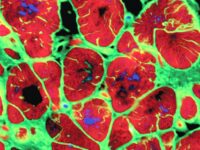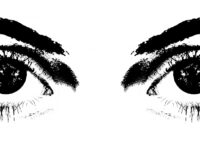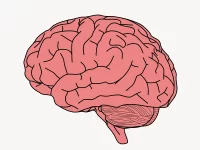Glaucoma is an eye disease where rear optic nerve damage causes a loss of vision. This damage can be caused by the buildup of fluid in the eye due to the inability to drain such fluid out of the front of the eye. The fluid normally travels through the trabecular meshwork in the anterior chamber, a drainage pathway located between the cornea and the iris. However, sometimes the trabecular meshwork becomes blocked, preventing drainage and causing a buildup of pressure from the fluid.
Treatment for glaucoma typically focuses on preventing the progression of the disease and includes prescription eye drops to decrease pressure in the eyes, laser treatment to drain fluid out of the eye, and even surgery. Currently, researchers at the Baranov lab at Massachusetts Eye and Ear are focused on a new type of treatment that utilizes the replacement of retinal ganglion cells, or neurons that connect the brain’s visual processing regions and retinal input, with stem cells. Previously, many researchers pursuing this cell replacement therapy faced the dilemma of donor stem cells refusing to migrate to the optimal position in the retina for proper cell replacement treatment. To promote and direct cell migration of retinal ganglion cells, researchers at the Baranov lab applied chemokines to the donor stem cells. Chemokines are small proteins that bind to surface-level chemokine receptors, promoting cell migration and adhesion. Of the many chemokines, they found that stromal cell–derived factor-1 had the greatest results in retinal ganglion cell recruitment. Though this method for glaucoma treatment is still being researched, the research so far yields promising results that can eventually aid vision restoration for those with glaucoma. Additionally, the researchers discussed the possibility of using this treatment method for other neurodegenerative conditions by employing stem cells promoted with specific chemokines to repair and promote cell behavior.
“Though this method for glaucoma treatment is still being researched, many promising results are produced that can eventually help in vision restoration for those with glaucoma.”
Eye health is essential to everyday life, and it is important to maintain good eye health through good habits. Zinc, lutein, and zeaxanthin, which are key to the retina, can be acquired by eating a balanced diet of fruits, vegetables, and supplementing seafood. Sunglasses are also a useful form of protection that blocks and reflects ultraviolet radiation from the sun, shielding eyes and maintaining eye health. Continuous exposure to sun ultraviolet radiation can modify proteins in the eyes’ lenses, leading to a loss of vision and blurriness. These tips can also help prevent the onset of glaucoma. It is important to get regular eye checkups, regardless of the use of vision correction, to maintain and treat eye health.






